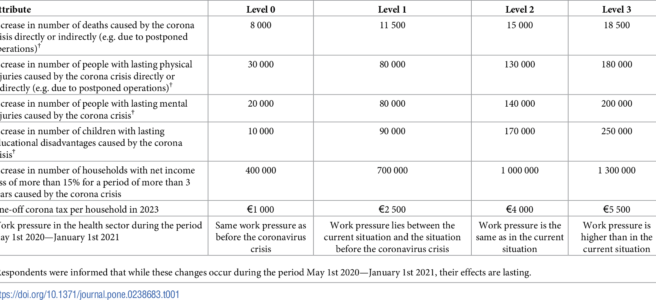A new paper about trade offs between health and economic effects of lockdown policies, with a particular focus on moral taboo-based decision-making, has been published today in Plos One (see the paper here). The paper is a joint effort of Caspar Chorus, Niek Mouter and Erlend Dancke Sandorf, and is co-sponsored by the TU Delft Covid-19 response fund.
The research was discussed in a news item on leading Dutch news outlet NOS, which zoomed in on the taboos surrounding cost-benefit analysis in the context of covid-policy development.
The abstract of the paper is as follows:
We report and interpret preferences of a sample of the Dutch adult population for different strategies to end the so-called ‘intelligent lockdown’ which their government had put in place in response to the COVID-19 pandemic. Using a discrete choice experiment, we invited participants to make a series of choices between policy scenarios aimed at relaxing the lockdown, which were specified not in terms of their nature (e.g. whether or not to allow schools to re-open) but in terms of their effects along seven dimensions. These included health-related effects, but also impacts on the economy, education, and personal income. From the observed choices, we were able to infer the implicit trade-offs made by the Dutch between these policy effects. For example, we find that the average citizen, in order to avoid one fatality directly or indirectly related to COVID-19, is willing to accept a lasting lag in the educational performance of 18 children, or a lasting (>3 years) and substantial (>15%) reduction in net income of 77 households. We explore heterogeneity across individuals in terms of these trade-offs by means of latent class analysis. Our results suggest that most citizens are willing to trade-off health-related and other effects of the lockdown, implying a consequentialist ethical perspective. Somewhat surprisingly, we find that the elderly, known to be at relatively high risk of being affected by the virus, are relatively reluctant to sacrifice economic pain and educational disadvantages for the younger generation, to avoid fatalities. We also identify a so-called taboo trade-off aversion amongst a substantial share of our sample, being an aversion to accept morally problematic policies that simultaneously imply higher fatality numbers and lower taxes. We explain various ways in which our results can be of value to policy makers in the context of the COVID-19 and future pandemics.
